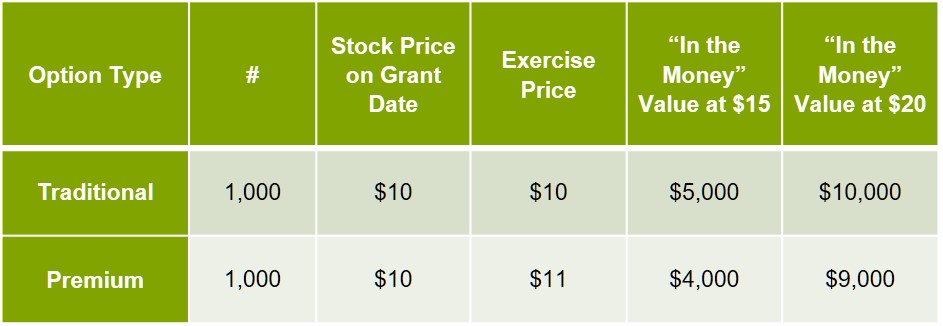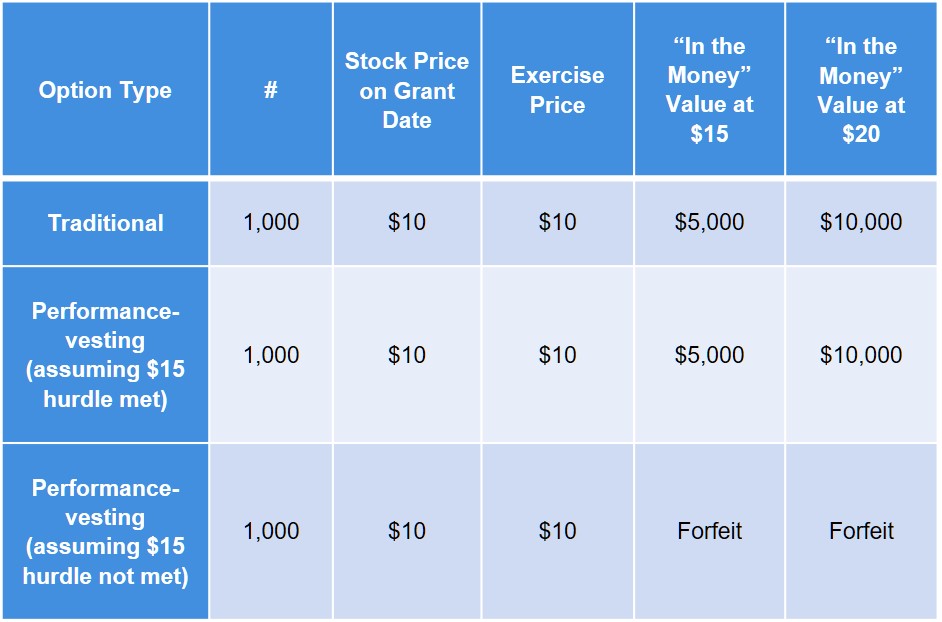
Advisor Blog | May 2019
A Possible Solution to Growth Biotech’s Performance-Based Equity Conundrum
Many in this sector have issues with performance-based equity—here are two potential solutions for your long-term incentive plan.
I work with many emerging growth biotechnology and pharmaceutical companies that struggle with using performance-based equity, a type of long-term incentive award that contains specific long-term performance goals. These awards have gained wide acceptance in the broader market but have yet to gain significant traction in growth biotech. Companies in this segment have well-grounded reasons for their reluctance to implement such plans.
- Many of these companies are pre-commercial, which largely renders traditional financial metrics as ineffective or even useless.
- Longer-term drug pipeline-based goals have the potential to incent the wrong behaviors if the company needs to shift their focus or strategy away from certain programs.
- Measuring total shareholder return relative to a peer group is highly imprecise given the speculative nature of stock trading in this sector and the associated volatility.
- Replicating long-term goals for each annual equity grant is challenging, creates complexity, and reduces the intended incentive effect.
- They predominantly use stock options that vest over time, which have exceptional pay and performance attributes even though proxy advisors and certain institutional investors no longer consider them to be performance-based.
In some cases, the stars align, and a company implements an effective performance-based equity program for a given year; but for many it is a frustrating experience. This is amplified by the fact that many companies in this sector are considering performance conditions on equity grants to be responsive to negative proxy advisory commentary or shareholder critiques.
Inevitably for most, one of two things happen. One, the company reluctantly puts together a set of performance goals that are “fine” and finalizes a program that hopefully will be an effective retention and motivation tool, as well as satisfy the proxy advisors and shareholders at next year’s annual meeting. Two, the company decides to risk it and continue with the time-based equity in hopes of good shareholder return performance that will mitigate any exposure they may have to criticisms on their equity award structure.
Two potential solutions to this problem are to grant a portion of each executive’s total grant in either:
- Premium-priced options. These are traditional stock options with a time-based vesting schedule but have an exercise price that is above the trading price on the date of grant. ISS will consider equity awards to be performance-conditioned if the exercise price is at least 10% above the stock price on the date of grant. They do suggest that a higher premium may be required for stock trading at a low price, so it would be worth researching and confirming the appropriate premium level before implementing. See below for an example of a stock option with a 10% premium price:

- Performance-vesting options. These are traditional stock options with both a time-based vesting schedule and, in this case, a stock price hurdle. The hurdle(s) is set by the company and the grantee is required to meet both the time-based vesting requirement and the stock price hurdle to vest in the award. See below for an example of a stock option with a $15 vesting hurdle:

Both premium-priced and performance-vesting options have the following advantages:
- Bolster shareholder alignment;
- Considered performance-based by ISS and Glass Lewis (assuming you meet their criteria);
- Do not require financial or pipeline goal-setting or relative shareholder return comparisons;
- Can be easily replicated year over year for annual long-term incentive grants; and
- Are relatively simple and easy to understand.
For many, this presents an interesting alternative to consider if the company, compensation committee, or board are considering performance-based equity awards. Companies that are seriously considering this type of instrument should work with experts that understand how to design these awards to ensure that they are properly constructed in a way that meets the needs and requirements of multiple constituencies.
